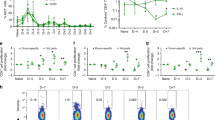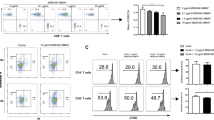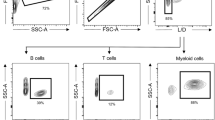Abstract
Apoptotic cell transfer has been found to be able to facilitate engraftment of allograft. However, the underlying mechanisms remain to be fully understood. Here we demonstrate that intravenous administration of donor apoptotic splenocytes can promote pancreatic islet engraftment by inducing generation of tolerogenic dendritic cells (Tol-DCs) and expansion of CD4+Foxp3+ regulatory T cells (Tregs). In vivo clearance of either dendritic cells (DCs) or Tregs prevented the induction of immune tolerance by apoptotic cell administration. Transient elimination of Tregs using anti-CD25, monoclonal antibody (mAb) abrogated the generation of Tol-DCs after administration of apoptotic splenocytes. Reciprocally, depletion of DCs within CD11c-DTR mice using diphtheria toxin (DT) prevented the generation of Tregs in the recipients with administration of apoptotic splenocytes. Induction of Tregs by Tol-DCs required direct cell contact between the two cell types, and programmed death 1 ligand (PD-L1) played important role in the Tregs expansion. Apoptotic cell administration failed to induce Tol-DCs in IL-10-deficient and Smad3-deficient mice, suggesting that IL-10 and transforming growth factor-β (TGF-β) are needed to maintain DCs in the tolerogenic state. Therefore, we demonstrate that Tol-DCs promote the expansion of Tregs via PD-L1 on their surface and reciprocally Tregs facilitate Tol-DCs to maintain transplantation tolerance induced by apoptotic cells via secreting IL-10 and TGF-β.
This is a preview of subscription content, access via your institution
Access options
Subscribe to this journal
Receive 12 digital issues and online access to articles
$119.00 per year
only $9.92 per issue
Buy this article
- Purchase on Springer Link
- Instant access to full article PDF
Prices may be subject to local taxes which are calculated during checkout





Similar content being viewed by others
References
Chinnakotla S, Davis GL, Vasani S, Kim P, Tomiyama K, Sanchez E et al. Impact of sirolimus on the recurrence of hepatocellular carcinoma after liver transplantation. Liver Transpl 2009; 15: 1834–1842.
MacDonald A . Improving tolerability of immunosuppressive regimens. Transplantation 2001; 72: S105–S112.
Erwig LP, Henson PM . Clearance of apoptotic cells by phagocytes. Cell Death Differ 2008; 15: 243–250.
Voll RE, Herrmann M, Roth EA, Stach C, Kalden JR, Girkontaite I . Immunosuppressive effects of apoptotic cells. Nature 1997; 390: 350–351.
Chen W, Frank ME, Jin W, Wahl SM . TGF-beta released by apoptotic T cells contributes to an immunosuppressive milieu. Immunity 2001; 14: 715–725.
Sun E, Gao Y, Chen J, Roberts AI, Wang X, Chen Z et al. Allograft tolerance induced by donor apoptotic lymphocytes requires phagocytosis in the recipient. Cell Death Differ 2004; 11: 1258–1264.
Kushwah R, Oliver JR, Zhang J, Siminovitch KA, Hu J . Apoptotic dendritic cells induce tolerance in mice through suppression of dendritic cell maturation and induction of antigen-specific regulatory T cells. J Immunol 2009; 183: 7104–7118.
Kleinclauss F, Perruche S, Masson E, de Carvalho BM, Biichle S, Remy-Martin JP et al. Intravenous apoptotic spleen cell infusion induces a TGF-beta-dependent regulatory T-cell expansion. Cell Death Differ 2006; 13: 41–52.
Fujiki M, Esquivel CO, Martinez OM, Strober S, Uemoto S, Krams SM . Induced tolerance to rat liver allografts involves the apoptosis of intragraft T cells and the generation of CD4+CD25+FoxP3+ T regulatory cells. Liver Transpl 2010; 16: 147–154.
Sakaguchi S, Yamaguchi T, Nomura T, Ono M . Regulatory T cells and immune tolerance. Cell 2008; 133: 775–787.
Sakaguchi S, Sakaguchi N, Asano M, Itoh M, Toda M . Immunologic self-tolerance maintained by activated T cells expressing IL-2 receptor alpha-chains (CD25). Breakdown of a single mechanism of self-tolerance causes various autoimmune diseases. J Immunol 1995; 155: 1151–1164.
Hori S, Nomura T, Sakaguchi S . Control of regulatory T cell development by the transcription factor Foxp3. Science 2003; 299: 1057–1061.
Fontenot JD, Gavin MA, Rudensky AY . Foxp3 programs the development and function of CD4+CD25+ regulatory T cells. Nat Immunol 2003; 4: 330–336.
Pandiyan P, Zheng L, Ishihara S, Reed J, Lenardo MJ . CD4+CD25+Foxp3+ regulatory T cells induce cytokine deprivation-mediated apoptosis of effector CD4+ T cells. Nat Immunol 2007; 8: 1353–1362.
von Boehmer H . Mechanisms of suppression by suppressor T cells. Nat Immunol 2005; 6: 338–344.
Read S, Malmstrom V, Powrie F . Cytotoxic T lymphocyte-associated antigen 4 plays an essential role in the function of CD25+CD4+ regulatory cells that control intestinal inflammation. J Exp Med 2000; 192: 295–302.
Morelli AE, Thomson AW . Tolerogenic dendritic cells and the quest for transplant tolerance. Nat Rev Immunol 2007; 7: 610–621.
Banchereau J, Steinman RM . Dendritic cells and the control of immunity. Nature 1998; 392: 245–252.
Steinman RM, Hawiger D, Nussenzweig MC . Tolerogenic dendritic cells. Annu Rev Immunol 2003; 21: 685–711.
Bonham CA, Peng L, Liang X, Chen Z, Wang L, Ma L et al. Marked prolongation of cardiac allograft survival by dendritic cells genetically engineered with NF-kappa B oligodeoxyribonucleotide decoys and adenoviral vectors encoding CTLA4-Ig. J Immunol 2002; 169: 3382–3391.
Sun W, Wang Q, Zhang L, Pan J, Zhang M, Lu G et al. TGF-beta1 gene modified immature dendritic cells exhibit enhanced tolerogenicity but induce allograft fibrosis in vivo. J Mol Med 2002; 80: 514–523.
Zhang M, Wang Q, Liu Y, Sun Y, Ding G, Fu Z et al. Effective induction of immune tolerance by portal venous infusion with IL-10 gene-modified immature dendritic cells leading to prolongation of allograft survival. J Mol Med 2004; 82: 240–249.
Wang Q, Liu Y, Wang J, Ding G, Zhang W, Chen G et al. Induction of allospecific tolerance by immature dendritic cells genetically modified to express soluble TNF receptor. J Immunol 2006; 177: 2175–2185.
Hackstein H, Thomson AW . Dendritic cells: emerging pharmacological targets of immunosuppressive drugs. Nat Rev Immunol 2004; 4: 24–34.
Morelli AE, Thomson AW . Dendritic cells: regulators of alloimmunity and opportunities for tolerance induction. Immunol Rev 2003; 196: 125–146.
Chauveau C, Remy S, Royer PJ, Hill M, Tanguy-Royer S, Hubert FX et al. Heme oxygenase-1 expression inhibits dendritic cell maturation and proinflammatory function but conserves IL-10 expression. Blood 2005; 106: 1694–1702.
O'Neill DW, Adams S, Bhardwaj N . Manipulating dendritic cell biology for the active immunotherapy of cancer. Blood 2004; 104: 2235–2246.
Roncarolo MG, Levings MK, Traversari C . Differentiation of T regulatory cells by immature dendritic cells. J Exp Med 2001; 193: F5–F9.
Dhodapkar MV, Steinman RM, Krasovsky J, Munz C, Bhardwaj N . Antigen-specific inhibition of effector T cell function in humans after injection of immature dendritic cells. J Exp Med 2001; 193: 233–238.
Cong Y, Konrad A, Iqbal N, Hatton RD, Weaver CT, Elson CO . Generation of antigen-specific, Foxp3-expressing CD4+ regulatory T cells by inhibition of APC proteosome function. J Immunol 2005; 174: 2787–2795.
Wakkach A, Fournier N, Brun V, Breittmayer JP, Cottrez F, Groux H . Characterization of dendritic cells that induce tolerance and T regulatory 1 cell differentiation in vivo. Immunity 2003; 18: 605–617.
Torres-Aguilar H, Aguilar-Ruiz SR, Gonzalez-Perez G, Munguia R, Bajana S, Meraz-Rios MA et al. Tolerogenic dendritic cells generated with different immunosuppressive cytokines induce antigen-specific anergy and regulatory properties in memory CD4+ T cells. J Immunol 2010; 184: 1765–1775.
Taner T, Hackstein H, Wang Z, Morelli AE, Thomson AW . Rapamycin-treated, alloantigen-pulsed host dendritic cells induce ag-specific T cell regulation and prolong graft survival. Am J Transplant 2005; 5: 228–236.
Onishi Y, Fehervari Z, Yamaguchi T, Sakaguchi S . Foxp3+ natural regulatory T cells preferentially form aggregates on dendritic cells in vitro and actively inhibit their maturation. Proc Natl Acad Sci USA 2008; 105: 10113–10118.
Tadokoro CE, Shakhar G, Shen S, Ding Y, Lino AC, Maraver A et al. Regulatory T cells inhibit stable contacts between CD4+ T cells and dendritic cells in vivo. J Exp Med 2006; 203: 505–511.
Tang Q, Adams JY, Tooley AJ, Bi M, Fife BT, Serra P et al. Visualizing regulatory T cell control of autoimmune responses in nonobese diabetic mice. Nat Immunol 2006; 7: 83–92.
Tang H, Guo Z, Zhang M, Wang J, Chen G, Cao, X. Endothelial stroma programs hematopoietic stem cells to differentiate into regulatory dendritic cells through IL-10. Blood 2006; 108: 1189–1197.
Liu X, Zhang Y, Yu Y, Yang X, Cao X . SOCS3 promotes TLR4 response in macrophages by feedback inhibiting TGF-beta1/Smad3 signaling. Mol Immunol 2008; 45: 1405–1413.
Zhang M, Xu S, Han Y, Cao X . Apoptotic cells attenuate fulminant hepatitis by priming Kupffer cells to produce interleukin-10 through membrane-bound TGF-β. Hepatology 2011; 53: 306–316.
Bittencourt MC, Perruche S, Contassot E, Fresnay S, Baron MH, Angonin R et al. Intravenous injection of apoptotic leukocytes enhances bone marrow engraftment across major histocompatibility barriers. Blood 2001; 98: 224–230.
Chen W, Han C, Xie B, Hu X, Yu Q, Shi L et al. Induction of Siglec-G by RNA viruses inhibits the innate immune response by promoting RIG-I degradation. Cell 2013; 152: 467–478.
Gotoh M, Maki T, Kiyoizumi T, Satomi S, Monaco AP . An improved method for isolation of mouse pancreatic islets. Transplantation 1985; 40: 437–438.
Tokita D, Shishida M, Ohdan H, Onoe T, Hara H, Tanaka Y et al. Liver sinusoidal endothelial cells that endocytose allogeneic cells suppress T cells with indirect allospecificity. J Immunol 2006; 177: 3615–3624.
Scumpia PO, McAuliffe PF, O'Malley KA, Ungaro R, Uchida T, Matsumoto T et al. CD11c+ dendritic cells are required for survival in murine polymicrobial sepsis. J Immunol 2005; 175: 3282–3286.
Couper KN, Blount DG, de Souza JB, Suffia I, Belkaid Y, Riley EM . Incomplete depletion and rapid regeneration of Foxp3+ regulatory T cells following anti-CD25 treatment in malaria-infected mice. J Immunol 2007; 178: 4136–4146.
Kushwah R, Wu J, Oliver JR, Jiang G, Zhang J, Siminovitch KA et al. Uptake of apoptotic DC converts immature DC into tolerogenic DC, which induce differentiation of Foxp3+ regulatory T cells. Eur J Immunol 2010; 40: 1022–1035.
Perruche S, Zhang P, Liu Y, Saas P, Bluestone JA, Chen W . CD3-specific antibody-induced immune tolerance involves transforming growth factor-beta from phagocytes digesting apoptotic T cells. Nat Med 2008; 14: 528–535.
Ravichandran KS, Lorenz U . Engulfment of apoptotic cells: signals for a good meal. Nat Rev Immunol 2007; 7: 964–974.
Wang L, Pino-Lagos K, de Vries VC, Guleria I, Sayegh MH, Noelle RJ . Programmed death 1 ligand signaling regulates the generation of adaptive Foxp3+CD4+ regulatory T cells. Proc Natl Acad Sci USA 2008; 105: 9331–9336.
Keir ME, Butte MJ, Freeman GJ, Sharpe AH . PD-1 and its ligands in tolerance and immunity. Annu Rev Immunol 2008; 26: 677–704.
Fife BT, Pauken KE, Eagar TN, Obu T, Wu J, Tang Q et al. Interactions between PD-1 and PD-L1 promote tolerance by blocking the TCR-induced stop signal. Nat Immunol 2009; 10: 1185–1192.
Gross C, Jonuleit H, Wiendl H . Fulfilling the dream: tolerogenic dendritic cells to treat multiple sclerosis. Eur J Immunol 2012; 42: 569–572.
Burrell B, Nakayama Y, Xu J, Brinkman C, Bromberg J . Regulatory T cell induction, migration, and function in transplantation. J Immunol 2012; 189: 4705–4711.
Acknowledgements
This work was supported by the National High Biotechnology Research and Development Program of China (2012AA020901 and 2006AA02A239), National Natural Science Foundation of China (81230074 and 30801000) and National Key Basic Research Program of China (2013CB530503).
Author information
Authors and Affiliations
Ethics declarations
Competing interests
The authors declare no competing financial interests.
Rights and permissions
About this article
Cite this article
Wu, C., Zhang, Y., Jiang, Y. et al. Apoptotic cell administration enhances pancreatic islet engraftment by induction of regulatory T cells and tolerogenic dendritic cells. Cell Mol Immunol 10, 393–402 (2013). https://doi.org/10.1038/cmi.2013.16
Received:
Revised:
Accepted:
Published:
Issue Date:
DOI: https://doi.org/10.1038/cmi.2013.16
Keywords
This article is cited by
-
Platelets as delivery vehicles for targeted enrichment of NO· to cerebral glioma for magnetic resonance imaging
Journal of Nanobiotechnology (2023)
-
A current perspective on cancer immune therapy: step‐by‐step approach to constructing the magic bullet
Clinical and Translational Medicine (2017)
-
Weissella cibaria WIKIM28 ameliorates atopic dermatitis-like skin lesions by inducing tolerogenic dendritic cells and regulatory T cells in BALB/c mice
Scientific Reports (2017)
-
Peripheral blood mononuclear cell secretome for tissue repair
Apoptosis (2016)
-
Apoptotic cell-treated dendritic cells induce immune tolerance by specifically inhibiting development of CD4+ effector memory T cells
Immunologic Research (2016)



